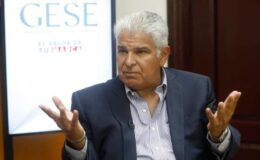The 4 Day Workweek has risen as the HOT topic of early election debates.
- By : James Bryson
- Category : Politics

“Senseless and crazy,” is how some economists described the proposal of vice president and presidential candidate José Gabriel Carrizo, to reduce the working day to four days a week, with ten hours of work per day, and increase the minimum wage to $1,000.
“It is a crazy proposal, which has not gone through a period of analysis and which is impracticable in Panama, in the short term,” economist Rolando Gordón told La Estrella de Panamá .
According to the specialist, reality makes it not feasible to force companies to submit to this type of initiatives, given that Panama is going through a scenario of high labor informality and unemployment.
This view is also shared by the business consultant and labor expert René Quevedo, who explained that in the last decade (2013-2023), it was the government that was in charge of producing the greatest number of jobs, therefore, it is not sustainable to think that the salary could be increased and the working days reduced, in a short time.
“During that period, 25,705 private salaried jobs were lost, but 77,234 civil servants and 235,480 new informal jobs were added to the economy,” he explained.
“Each private salaried worker who lost his job, in that decadence, was replaced, in the economy, by 3 civil servants and 9 informal workers, a symptom of a severe process of precariousness and labor nationalization, a product of the loss of confidence in the climate for the private investment in the country,” he added.
This situation increased during the pandemic, when “between August 2019 and August 2023, 17,974 jobs were created, which is the balance resulting from the loss of 19,812 salaried jobs in the private sector, the incorporation of 36,482 civil servants to the state payroll and 49,039 new informal workers. to the economy,” said Quevedo.
In this context, Vice President Carrizo’s proposal is observed by Quevedo as something that “does not make much sense”, because the country has an economy that “only generates informal employment and, where 2 out of every 3 jobs in the private sector are informal , or employees of companies with less than 10 workers,” he explained.
Temístocles Rosas, president of the National Council of Private Enterprise (CoNEP), told ‘La Decana’ that another factor to consider is the Labor Code, which, in its article 70, establishes that the maximum daytime work day is eight hours and the working day week of up to 48, so increasing the workload to 10 hours requires that current legislation be modified.
“Our country bases its economic structure on logistics, tourism and trade. These three activities are 24/7, so a regulation of 4 working days would affect their productivity,” he said.
Data from the report ‘Ready to take off? Take advantage of macroeconomic stability for growth’, issued by the Inter-American Development Bank (IDB) a week ago, shows that productivity is the weakest point in Latin America and the Caribbean, because it only increased by 0.06%, in the last five decades. If Latin America and the Caribbean are measured separately, the productivity growth data in that period were 1.85% and 1.3%, respectively.
In Gordon’s opinion, this measure would only increase the country’s productivity crisis. “Requiring a person to work 10 hours in a row and be productive is difficult, unless the hours of rest at work are increased, but that is complex,” he said.
“It is striking that the idea of increasing the minimum wage to $1,000 was proposed by the workers’ unions a few months ago and it was determined that it was not feasible; “it is strange that it is now,” he added.
“It is important that candidates analyze what they are going to suggest before doing so, because it seems that the only thing they want is to get votes,” he said.
Around the world, more than 10 nations have begun to implement four-day workweeks, with varying degrees of success. Belgium, the United Kingdom, Scotland, Wales, Spain, Iceland, Sweden, Japan and New Zealand are incorporating projects along these lines. Meanwhile, Canada and the United States analyze it.
In November 2022, Belgian Prime Minister Alexander Croo announced that the country was going to give people and companies the “freedom” to adopt a four-day working day, but without reducing the workload of working hours in the week. and maintaining the same salary.
“The objective is to give more freedom to people and companies to organize their work time,” Croo justified, in conversations with local media. “If we compare our country with others, we will often see that we are much less dynamic,” he added.
On November 20, 2023, the Belgian newspaper Le Soir published an article titled “The failure of the four-day week”, in which it was argued, citing official sources, that only 0.5% of workers had accepted tailored, since there was “ a certain distrust” in the companies, which considered that their organizational structures are not compatible with four days of work.
To this we must add that many employees did not have adequate information to be able to request the change of days and that, some, considered that this could be a tool to increase their workload.
The British case was different. On June 6, 2022, a total of 61 local companies and more than 3,300 employees participated in a program led by local universities, in which the “100:80:100” model was tested, which consisted of maintaining 100% of the salary, while reducing the working day to 80% and maintaining 100% productivity.
According to data from 4 Day Week UK, 92% of participating companies decided to maintain the measure.
In Colombia, the initiative was applied by the company Grupo Hada, dedicated to the manufacture of soaps, at an international level. Under the name “Flexiviernes” it was decided that the 1,100 workers at its headquarters in Barranquilla would cut one day of work.
This decision was made after the entry into force of Law 2101 of 2021, which seeks to reduce working days, gradually, without altering the salary of workers. The legislation aims to reduce the working day from 48 to 42 hours a week, in four years.
Another country in the area that is studying the measure is Mexico, where lowering from 48 to 40 hours of weekly work has been under discussion since October 2022, without reaching a resolution on the issue. Various unions of society have spoken for and against and even the president of Mexico, Andrés Manuel López Obrador, has remained on the sidelines, asking that more meetings be held to reach a consensus.
In the midst of the debate, contradicting voices have been heard, such as that of businessman Carlos Slim, who in October 2023 proposed a 12-hour workday, for three days a week, and then changed his mind at the beginning of December, saying that “it is better for people to work 48 hours and earn more.”



No Comments